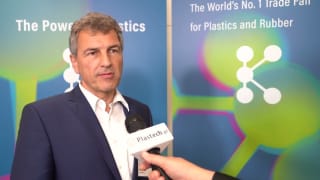
At drinktec 2025, Sumitomo (SHI) Demag will present its extensive all-electric packaging expertise, reaffirming the company’s new theme "Today. Tomorrow. Electric." Including how its PAC-E machine is leading the shift towards all-electric in the fast cycle caps and closures market.
Sumitomo (SHI) Demag is focusing its efforts on supporting fast-cycling packaging manufacturers to switch to cleaner and more efficient all-electric technologies. In addition to more than halving energy consumption, the fast cycle times and all-electric machine reliability are driving growth at scale for packaging manufacturers, reports Arnaud Nomblot, Director Business Development Packaging.
Blending the company’s high-speed and all-electric expertise, PAC-E saves packaging processors up to 50% in energy costs. Co-developed and tested in collaboration with the largest cap manufacturers in the world, the PAC-E machine has had both its ecological and economic benefits fully verified.
The drinktec PAC-E 420t exhibit features a 72-cavity tool from Z-Moulds, reliably producing 2,100 26/22 beverage caps every minute. The cell also comprises a mould area dehumidification system from Eisbär. IMDVista handles the entire downstream process: handling, cooling, inspection, sorting, and also a customized final packaging solution.

The all-electric PAC-E machine from Sumitomo (SHI) Demag saves manufacturers up to 50% in energy costs compared to a hybrid machine.
The machine pushes the limits in producing lightweight packaging with the fastest dry cycle time and an injection speed up to 550 mm/s. PAC-E is also cleaner, with a closed-loop lubrication system for producing applications with high hygiene requirements, such as food packaging and medical parts.
Measuring the performance improvements against a high-speed hybrid packaging machine, Nomblot shares an example of a production case study for carbonated soft drinks caps with a weight of 1.8 g and a 72-cavity tool. "With a 3.9 s cycle time and 8,000 hours of production per year, the energy savings represented 300 MWh annually. This corresponds to 90.000 € per year, with energy costs of 30 ct/kWh."
However, for mass manufacturers, it is the machine’s reliability and fast cycle times that increase production capacity and drive growth at scale, adds Nomblot. "This is where PAC-E really excels. Delivering a stable production pace and adapting to changes in dynamics to sustain an optimal performance." Currently available in 350 and 420 ton clamp force, all PAC-E machines are compatible with Sumitomo (SHI) Demag’s cross-platform, open data acquisition and analysis software "myAssist".
The machine also incorporates future digital product passport technology. "As an active member of the R-Cycle community, being able to offer this interoperable software goes a long way towards supporting plastic traceability and the drive towards larger carbon reductions right across the packaging value chain," adds Nomblot.




